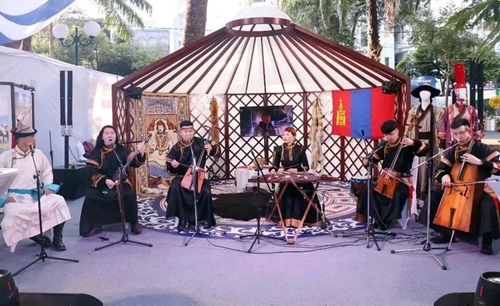The trip, starting September 30 and made at an invitation of Mongolian President Ukhnaagiin Khurelsukh, will play a significant role in orienting and opening up new prospects for bilateral cooperation, and create fresh momentum in various fields, particularly in trade, agriculture, and transportation, Thanh told the Vietnam News Agency.
    |
 |
|
Booth introducing Mongolia tourism at Ho Chi Minh City Tourism Festival 2024 last April |
He said that bilateral cooperation in economics, trade, and investment will be promoted in a more substantive, effective, and comprehensive manner, with trade promotion activities and efforts to connect businesses to be enhanced, and policies on improving the investment environment, and investment encouragement and protection strengthened to attract investment from both countries.
Collaboration in key areas such as transportation, labor, tourism, culture, and education will be stepped up in a meaningful and comprehensive way. The scholarship programs offered by both governments will also be expanded to meet the needs of their students. Additionally, joint work in other fields such as science, clean energy, renewable energy, and climate change adaptation will be intensified and promoted, Thanh highlighted.
Looking back upon the bilateral relations, the ambassador stated that Vietnam and Mongolia established their diplomatic relations on November 17, 1954. Mongolia was one of the first countries to establish its diplomatic ties with Vietnam, and Vietnam was the first country in Southeast Asia with which Mongolia formed such a relationship.
Over the past 70 years, the traditional friendship has continuously developed and achieved numerous accomplishments. Currently, based on mutual understanding and respect, this relationship is increasingly being strengthened, particularly in the areas of security, defense, economics, and trade.
The two countries have achieved a high level of political understanding and trust, considering each other as important partners, as reflected through the regular exchange of high-level delegations, the sharing of views on maintaining regional peace and stability, and the signing of various documents that establish frameworks for bilateral cooperation.
The two nations have actively cooperated in areas such as deploying peacekeeping forces for the United Nations (U.N.) and military medicine; and enhanced coordination and supported each other at various international forums, including the U.N., the World Trade Organization (WTO), the Asia-Europe Meeting (ASEM), the Asia-Pacific Economic Cooperation (APEC), the ASEAN Regional Forum (ARF), and other regional organizations.
Economic and trade cooperation is continually being expanded, with bilateral trade reaching over USD 130 million in 2023. Although bilateral trade remains modest, it holds significant potential for robust growth, particularly in the export of agricultural products, food, and consumer goods from Vietnam, stated Thanh, adding that Vietnam can become a market for Mongolian agricultural products and raw materials, such as coal, beef, goat meat, sheep meat, and livestock products.
According to the diplomat, there remains ample room for the two countries to further develop their relations in various fields, particularly in economics, trade, and agriculture.
In the economic sphere, both sides can focus on their strengths in areas such as mining, steel production, agricultural import and export, processed food, and livestock products.
In terms of tourism, the differences in climate and geography between the two countries offer attractive travel products for each other's visitors. Both nations are aiming to develop their tourism sectors and have waived visa requirements for tourists, opened direct flights, and created favorable conditions for the promotion and development of tourism in the coming time. This will help enhance people-to-people and cultural exchanges, Thanh said.
The ambassador also proposed the two sides collaborate in exchanging technology, experience, and agricultural products; and enhance cooperation in education and training, telecommunications, food processing, animal feed production, pharmaceuticals, and mining.
Source: VNA